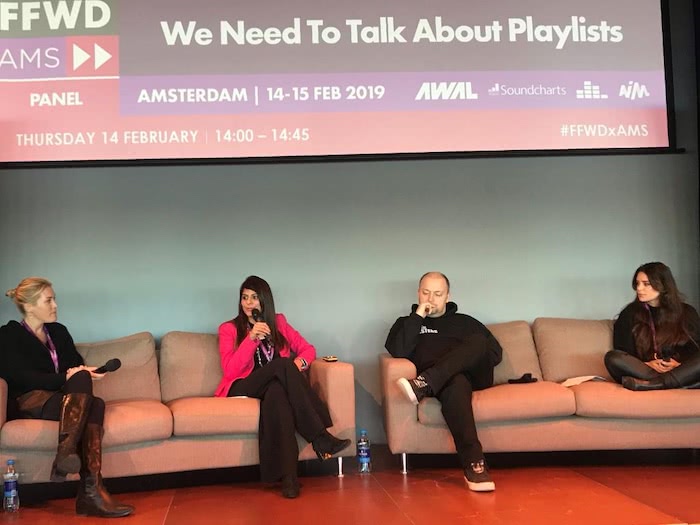International industry discusses local content quotas on streaming playlists

As the local industry fights for an Australian music quota across streaming platforms like Spotify and Apple Music, the international industry is still fairly new to the idea.
While jurisdictions around the world review copyright models to support local content, and as music contributes even more to economies each year, Australian artists and industry figures are calling for a benchmark for local music on streaming services.
APRA AMCOS CEO Dean Ormston was of the linchpins behind the submission made to the Federal Government. In his statement regarding the Senate Inquiry, he said a creative approach is being discussed:
“We’re in conversations with music streaming services around the concept of benchmarking locally-curated playlists to ensure there is always an opportunity for Australian music to be heard and discovered by local audiences and mitigate the risk of foreign artists unfairly dominating local charts,” Ormston said.
Late last week, when 150 global music industry figures gathered at FastForward Amsterdam to discuss some critical issues affecting its sector, a panel of delegates from South Africa, the US and the UK weighed in on local content quotas for streaming services.
Catherine Lückhoff, CIO at Swipe iX agreed there should be some form of benchmark:
“We try to do the same thing at the South African Broadcasting Association,” she said onstage at the Muziekgebouw aan ‘t IJ.
“Nigeria did a really good thing where they decided with shows like Big Brother, they were only allowed to play Nigerian music. And in the last 10-15 years Nigerian music has overtaken any Western music. If you go in a club in Lagos, you’ll pretty much only hear Nigerian music […] The more we support local art and culture as a rule, the better for everyone.”
“[…] I think quotas will just make it more fair. Sure, you’re going to listen to a popular US artist before you’re going to listen to a local artist. But that [local artist] could potentially also really be good.”

Catherine Luckhoff (Swipe iX), Aditi Arora (Gracenote), Darren Hemmings (Motive Unknown), Poppy Reid (Moderator, The Brag Media). Source: Gracenote Twitter
Darren Hemmings, Managing Director at Motive Unknown, said:
“I feel like it’s something that needs to be a quota around the lean back experience. I think if you’re actively listening to playlists and you don’t like what you hear, irrespective of what it is, you’re just going to skip through it.
“[…] It’s much more subversive to have it in these shows, or in a public forum and things like that,” he added. “But equally, on much more radio-like experiences it would probably be better to go in there.
“Theres always this sort of ‘Dave the painter’ who’s always got the radio on while he works and he’s not going to move to skip stuff. And that’s where it’s more meaningful for it to go in than if it’s on a playlist where you’re [able to say] ‘I don’t like that’ and skip.”
Aditi Arora, Director of Product Management at Gracenote, said:
“If you look at the global streaming services across Europe, across the US, across the majority of the other markets as well – especially in Japan, Korea and India – all these global services have content from everywhere,” she said. “It’s not limited to local artists.”
“[…] We did a quick study to see the breakdown of the Top 200 songs globally. What we found was out of the 200, at least 50% was Western content. But there was a lot of Latin content, K-Pop content, we saw Indian artists in there, we saw and a bunch of artists from countries that we didn’t expect to be there.
“We live in a global economy right now,” Arora added. “What people listen to and what they like… for radio, yes quotas might work; but for the kind of digital services where if you don’t like content [you can skip].
“I don’t know how quotas will play out but it does present a global opportunity as people have access to all the content around the world.”
Local content quotas are not an entirely new request
There has been an Australian quota for radio since 1942 and for television since 1961. But radio has been dodging its 25% quota via broadcast time loopholes for some time. While TV channels are required to play two hours of prime time original Australian drama content each week, hence our continued production of Home and Away and Neighbours.
There’s no silver bullet in the fight for local content to pierce through the noise. But with Australian music making up just 10% of the Top 100 songs on the ARIA chart last year – and with Ed Sheeran’s entire 16-song album landing in the weekly Top 40 singles chart in Australia in March 2017 – it’s a battle worth fighting.
FastForward returns to Sydney’s University of Technology Sydney (UTS) on 11-12 April, before its staging in London in September.
This article originally appeared on The Industry Observer, which is now part of The Music Network.

































